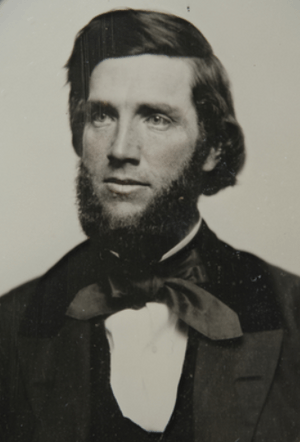Erastus Newton Bates facts for kids
Quick facts for kids
Erastus Newton Bates
|
|
|---|---|

Erastus Newton Bates c. 1858
|
|
| Born | February 29, 1828 Plainfield, Massachusetts |
| Died | May 29, 1898 (aged 70) Minneapolis, Minnesota |
| Place of burial | |
| Allegiance | United States of America Union |
| Service/ |
United States Army Union Army |
| Years of service | 1862–1865 (Army) |
| Rank | |
| Unit | 80th Illinois Volunteer Infantry Regiment |
| Battles/wars | American Civil War |
| Other work | Illinois House of Representatives (1857–1859) Illinois Treasurer (1869–1873) |
Erastus Newton Bates (born February 29, 1828 – died May 29, 1898) was an American politician and a general from Massachusetts. He went to Williams College. Bates was one of the first people to settle in Minnesota. He helped create its first state rules and served in the state senate. Later, he moved to Illinois. There, he fought in the Civil War. He was a prisoner of war for a long time. After the war, Bates was given the honorary rank of brevet brigadier general. When he returned home, he served in the Illinois House of Representatives and as the Illinois Treasurer.
Contents
Early Life and Education
Erastus Newton Bates was born in Plainfield, Massachusetts, on February 29, 1828. When he was eight years old, his family moved to Ohio. After his father passed away, Bates lived with an uncle. He worked and taught to earn money for college.
He was accepted to Williams College in Massachusetts. He graduated from there in 1853. He first studied law in New York City, New York.
Moving to Minnesota
Soon after studying law, Bates moved to Minnesota. He started his law practice in Minneapolis. In 1856, he was part of the group that created the rules for the new state of Minnesota. This group was called the Constitutional Convention. The next year, he was elected as a Republican to the first meeting of the Minnesota Senate.
Serving in the Civil War
In 1859, Bates moved to Centralia, Illinois. Three years later, he opened a law office there. When the Civil War began, he joined the army. He was given the rank of major in the 80th Illinois Volunteer Infantry Regiment. Later, he was promoted to lieutenant colonel.
Captured and Released
During the war, Confederate soldiers captured Bates. He was held as a prisoner of war in Libby Prison for fifteen months. He managed to escape, but he was quickly caught again. He was then moved to Morris Island. After he was finally released, he became a full colonel. He also received an honorary rank as a brigadier general. This special rank was given for his bravery and service.
After the War
When Erastus Newton Bates returned to Centralia after the war, he continued his political career. He was elected to the Illinois House of Representatives. He served one term, which lasted two years. After that, he was elected as the Illinois Treasurer. This job meant he was in charge of the state's money. He served two terms as Treasurer, each lasting two years.
Bates married Lucy A. Sanders in 1855. He passed away in Minneapolis, Minnesota on May 29, 1898. He was buried in Oak Ridge Cemetery in Springfield, Illinois.
 | William M. Jackson |
 | Juan E. Gilbert |
 | Neil deGrasse Tyson |

